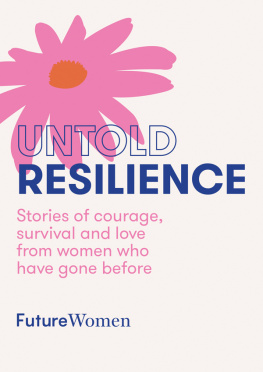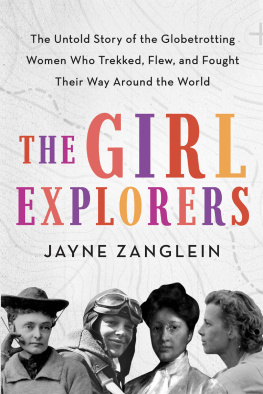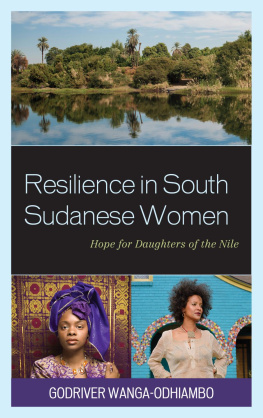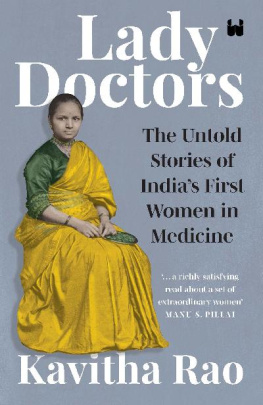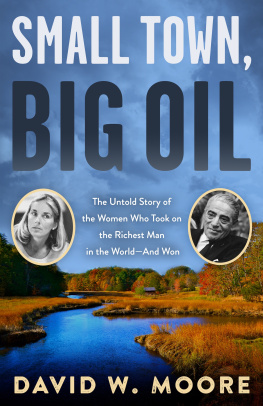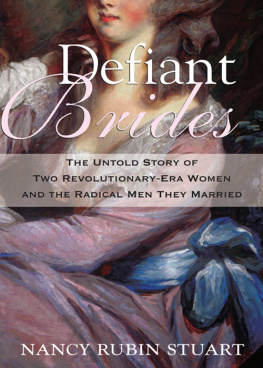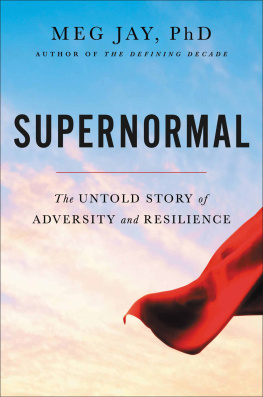Future Women - Untold Resilience
Here you can read online Future Women - Untold Resilience full text of the book (entire story) in english for free. Download pdf and epub, get meaning, cover and reviews about this ebook. year: 2021, publisher: Penguin Random House Australia, genre: Home and family. Description of the work, (preface) as well as reviews are available. Best literature library LitArk.com created for fans of good reading and offers a wide selection of genres:
Romance novel
Science fiction
Adventure
Detective
Science
History
Home and family
Prose
Art
Politics
Computer
Non-fiction
Religion
Business
Children
Humor
Choose a favorite category and find really read worthwhile books. Enjoy immersion in the world of imagination, feel the emotions of the characters or learn something new for yourself, make an fascinating discovery.
- Book:Untold Resilience
- Author:
- Publisher:Penguin Random House Australia
- Genre:
- Year:2021
- Rating:4 / 5
- Favourites:Add to favourites
- Your mark:
- 80
- 1
- 2
- 3
- 4
- 5
Untold Resilience: summary, description and annotation
We offer to read an annotation, description, summary or preface (depends on what the author of the book "Untold Resilience" wrote himself). If you haven't found the necessary information about the book — write in the comments, we will try to find it.
Untold Resilience — read online for free the complete book (whole text) full work
Below is the text of the book, divided by pages. System saving the place of the last page read, allows you to conveniently read the book "Untold Resilience" online for free, without having to search again every time where you left off. Put a bookmark, and you can go to the page where you finished reading at any time.
Font size:
Interval:
Bookmark:

A timely and uplifting book of true stories from 19 women whose resilience has seen them survive extraordinary global and personal tragedy.
What does it take to find courage in the midst of deprivation and devastation? Why are some people able to continue living with purpose, even when faced with loss and despair? And what can we learn from the exceptional women who have done just that?
It might feel like we are living in unprecedented times but ours is not the first generation to withstand upheaval as seismic as that caused by the COVID-19 pandemic.
Based on hours of interviews from their homes during lockdown, in Untold Resilience the all-female journalist team at Future Women uncovers the real-life accounts of a diverse and fascinating collection of women. With warmth and candour, these 19 ordinary, and yet truly remarkable, individuals share their experiences of pandemic, poverty, famine, war, violence and discrimination, drawing on the wisdom and perspective that can only be gained from a life fully lived.
Through these hope-filled stories from women who have gone before, we can find inspiration and comfort, and rebuild faith in our own futures.
Edited by Helen McCabe and Jamila Rizvi


In memory of the grandmothers whose advice we miss so much,
Margaret Peg Bowes and Queenie McCabe; and of Lakshmi Maksay, who died shortly after sharing her extraordinary story with Future Women.
And dedicated to the nineteen women who opened their lives, hearts and memories to us.
For young people who have never been through any of those things, or lived in a time when they were happening, this seems just frightful... But if youve witnessed, heard about and know people whove been through these other things, you think, Well, were going to make it through this.
Margaret Atwood
It was Booker Prize-winning author and international treasure Margaret Atwood who did it. It was her fault I found myself sitting on the bathroom floor with my back against the door (to block my insistent four-year-old from entering). Id been listening to her speak on the popular Dear Sugar podcast when she said the words inscribed above. In that moment, my previously stalwart efforts to avoid giving in to pandemic grief began to fail. I sat there beside the toilet, my poor old bum soaking in the coldness of the tiles, and sobbed until there was nothing left inside.
My coronavirus isolation happened hard and fast. The night before, Id been at a Future Women event full of smart, diverse and very funny women. While guests had avoided the standard hug-and-kiss greeting, the room was still absolutely packed. This was a sell-out crowd. There were more than 250 people in the audience, each sitting quietly side by side, captivated by the speakers on stage. We were moved and humbled. Now, when I think about that audiences prolonged proximity to one another, I cringe.
The next day, my husband and I made the decision to bunker down. I have a series of chronic conditions that make me particularly vulnerable to illness. In the early days when people were casually saying things like, Its only sick and old people who will die from the coronavirus, I was one of those whose death was apparently acceptable. I needed to stay safe and, for that to happen, my family needed to keep themselves safe as well. We agreed that over the weekend wed make the necessary preparations to self-isolate, suspecting that everyone would be joining us sooner or later.
And then my husband got sick.
It is a truth universally acknowledged that nobody experiences a cold quite like a man, and the one I married embodies this clich. But this was no ordinary seasonal sneeze-fest. Jeremy had a high temperature, chills and a horribly sore throat. He had shortness of breath, aches and pains in his limbs and the most horrendous-sounding wet, rasping cough.
In the early days of the pandemic the criteria for testing was tight, unlike now. Australia didnt have enough tests to go around and we didnt know how bad the situation was going to get. Despite multiple visits to the doctor, Jeremy never qualified for the infamous nasal swab.
And so, our pandemic plan went into action earlier than anticipated. My son was away with his grandmother at the beach and we asked if he could stay there. We didnt want either of them exposed. Not seeing our little boy for weeks was genuinely tough. Jeremy stopped leaving the house at all and confined himself to our bedroom. I started sleeping in another room and left the house only occasionally, in search of caffeine, groceries and Codral. Every waking minute that I wasnt working or on FaceTime to my son was spent cleaning. I sterilised everything Jeremy touched. I was like the lady on the Spray n Wipe advertisement, who just loves scrubbing things until they sparkle. Bleach became my best mate.
Jeremy recovered slowly, though even after four weeks this fit and healthy man in his thirties still got puffed walking up the stairs. Well probably never know whether the coronavirus arrived in our home in March 2020 but thankfully nobody else in the family got sick. In the meantime, of course, the entire nation had been sent home. New restrictions were declared and updated repeatedly, and fines for breaking the rules increased. A national cabinet was formed, stimulus packages were announced and workers were laid off. Far fewer people left their homes to go to work. Neighbourhoods felt eerie and empty, despite kids being pulled out of school. Oh, and everyone started hoarding toilet paper.
During the ensuing months, a terrifying global picture was painted in real time on our smartphones and laptops. We no longer waited for the nightly news because updates were urgent and often. We felt nervous whenever alerts sounded on our phones and yet we compulsively read every new story that appeared, desperate for the next morbid update. We watched as people died around the world. First China, then Italy, then South Korea, the USA, and then... everywhere. Hundreds of thousands of lives lost. Many died without access to the health care that might have saved them. At home in Australia, unemployment figures were climbing steadily. Each meagre percentage point represented hundreds of thousands of real people and their families.
I was one of the lucky ones. While money got tighter in some ways, savings were made because we no longer went anywhere or did what wed usually do. The household remained financially secure and we were physically safe. Family and friends experienced a different and more frightening new normal where changed economic circumstances left them questioning how theyd get by. Loved ones on the other side of the world faced the confronting reality of attending virtual funerals and wondering who might die next. People living in developing countries or housed in close proximity in refugee camps had little to no chance of being able to physically distance. How do you prevent spread when there is one water source for every 20,000 people and soap is a rarity?
Im a somewhat anxious person. My mum calls me a worrier. But I suspect that I found isolation easier than I otherwise might have because previous illness had left me stuck at home for long periods of time. Despite being a ferocious extrovert, I was used to the slower and quieter pace of life. I was busy with work, I felt safe in my home and well, who was I to be upset and struggling? I wonder if you felt the same. Almost as if you were unworthy of fear and panic when there were others doing it far tougher. Its a strange sort of grief: anxiety over an undetermined future, and your heart hurting for people you would never, and now will never, meet.
Font size:
Interval:
Bookmark:
Similar books «Untold Resilience»
Look at similar books to Untold Resilience. We have selected literature similar in name and meaning in the hope of providing readers with more options to find new, interesting, not yet read works.
Discussion, reviews of the book Untold Resilience and just readers' own opinions. Leave your comments, write what you think about the work, its meaning or the main characters. Specify what exactly you liked and what you didn't like, and why you think so.

